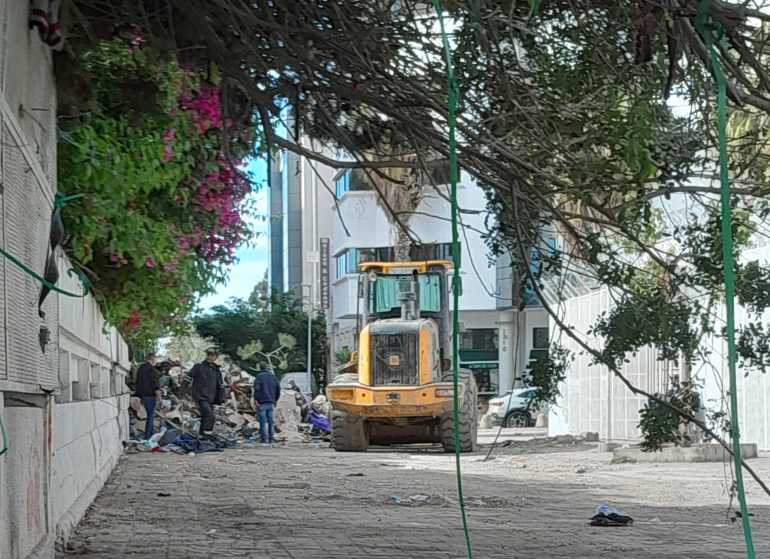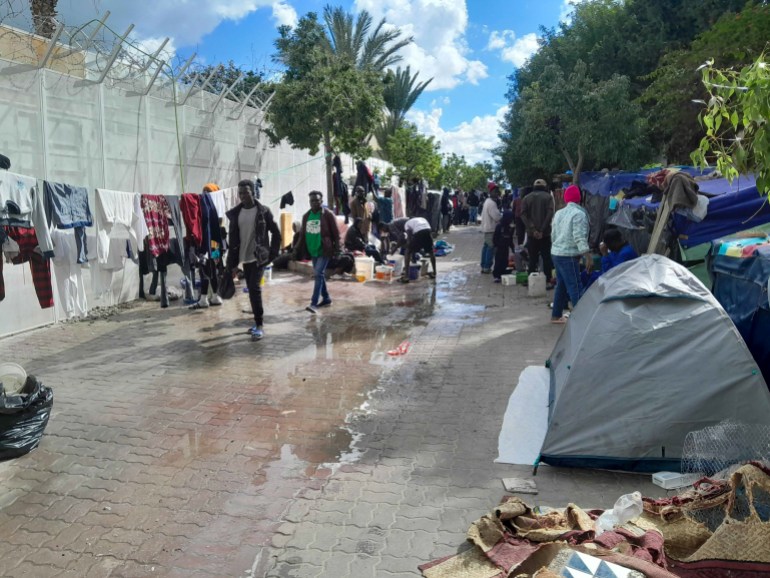Police cleared two of the Tunisian capital’s irregular Black migrant camps, busing residents to an unknown location.
According to local media reports, security forces swept into the encampments in the prosperous Berge de Lac business district early on Friday, rounding up men, women and children and destroying the shelters they had built.
One encampment was in a walled-off public park and the other was in an alleyway outside the United Nations’s International Organization for Migration (IOM).
A sit-in was being held by roughly 100 other refugees, principally from Sudan, outside the UNHCR’s offices, 6.6km (four miles) away.
Several infants born in Tunisia to refugee or migrant mothers were present when Al Jazeera visited the IOM camp on Tuesday.
The Refugees in Libya organisation retained some contact with the missing individuals who were able to communicate from the buses the police had forced them onto.
🚨Ongoing mass desert dumping by the Tunisian authorities.
Yesterday at approximately 3 am, multiple police forces including special riot control and anti-terrorism units dismantled the protest camp outside the UNHCR office in the Lac zone of Tunis. Hundreds of refugees and… pic.twitter.com/5uaYxDmR75
— Refugees In Libya (@RefugeesinLibya) May 3, 2024
This was broken off at around 7pm (18:00 GMT) after phone batteries failed.
According to the group’s spokesperson, David Yambio, the refugees and migrants had been let out of the buses about 5km (three miles) from the northwestern city of Jendouba, near the Algerian border.
“Babies and infants are hungry and thirsty, they told me,” he wrote by email, “The police told them nothing except for beatings and insults.”
Several nationalities were sheltering in central Tunis: Chadians, Sierra Leoneans and many Sudanese.
A significant number held cards issued by the UNHCR and, though Tunisia has no asylum laws, were still able to access basic medical care and a small stipend.
Video shared by Refugees in Libya showed police raiding the camp late at night, before showing refugees and migrants, including women and infants, being transported to the desert near Algeria.

Calls and emails to the IOM requesting details of the raid and what, if any, provision had been made for the people’s safety have so far gone unanswered.
Past accounts from refugees and migrants who had been bussed to the Algerian border have frequently included robbery by Tunisian gangs, as the groups try to walk back to Tunis and what they hope might be security.
Accusations by rights groups that refugees and migrants are being expelled by Tunisia to the Algerian and Libyan borders are longstanding, but Tunisian authorities have consistently denied the practice, which would breach international law, NGO Avocats Sans Frontieres (Lawyers without Borders) said.
Criticism of Tunisia’s treatment of the irregular Black refugee and migrant population who enter the country en route to Europe is not new.
Human Rights Watch, Avocats Sans Frontieres and Amnesty International have repeatedly condemned the Tunisian police and officials for their treatment of the vulnerable community.
